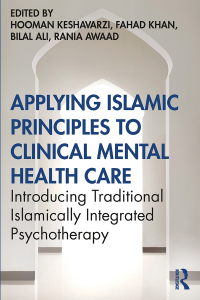Buy Applying Islamic Principles to Clinical Mental Health Care 1st Edition PDF ebook by author Hooman Keshavarzi; Rania Awaad; Fahad Khan – published by Routledge in 2021 and save up to 80% compared to the print version of this textbook. With PDF version of this textbook, not only save you money, you can also highlight, add text, underline add post-it notes, bookmarks to pages, instantly search for the major terms or chapter titles, etc.
You can search our site for other versions of the Applying Islamic Principles to Clinical Mental Health Care 1st Edition PDF ebook. You can also search for others PDF ebooks from publisher Routledge, as well as from your favorite authors. We have thousands of online textbooks and course materials (mostly in PDF) that you can download immediately after purchase.
Note: e-textBooks do not come with access codes, CDs/DVDs, workbooks, and other supplemental items.
eBook Details:
Full title: Applying Islamic Principles to Clinical Mental Health Care 1st Edition
Edition: 1st
Copyright year: 2021
Publisher: Routledge
Author: Hooman Keshavarzi; Rania Awaad; Fahad Khan
ISBN: 9781003043331
Format: PDF
Description of Applying Islamic Principles to Clinical Mental Health Care 1st Edition:
“This text outlines for the first time a structured articulation of an emerging Islamic orientation to psychotherapy, a framework presented and known as Traditional Islamically Integrated Psychotherapy (TIIP). TIIP is an integrative model of mental health care that is grounded in the core principles of Islam while drawing upon empirical truths in psychology. The book introduces the basic foundations of TIIP, then delves into the writings of early Islamic scholars to provide a richer understanding of the Islamic intellectual heritage as it pertains to human psychology and mental health. Beyond theory, the book provides readers with practical interventional skills illustrated with case studies as well as techniques drawn inherently from the Islamic tradition. A methodology of case formulation is provided that allows for effective treatment planning and translation into therapeutic application. Throughout its chapters, the book situates TIIP within an Islamic epistemological and ontological framework, providing a discussion of the nature and composition of the human psyche, its drives, health, pathology, mechanisms of psychological change, and principles of healing. Mental health practitioners who treat Muslim patients, Muslim clinicians, students of the behavioral sciences and related disciplines, and anyone with an interest in spiritually oriented psychotherapies will greatly benefit from this illustrative and practical text”–





